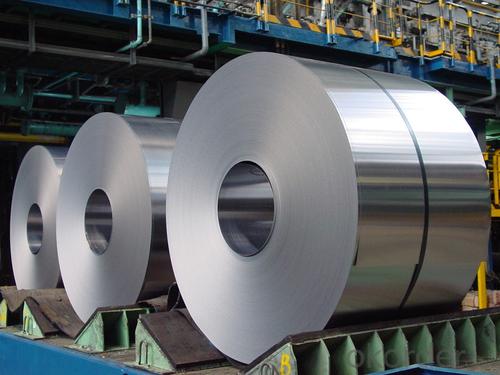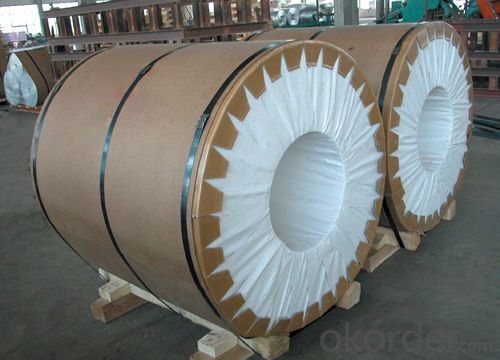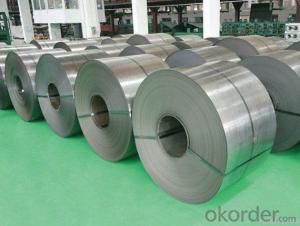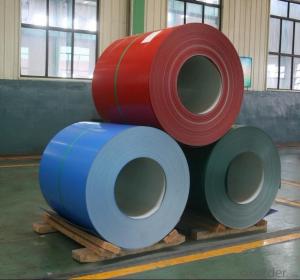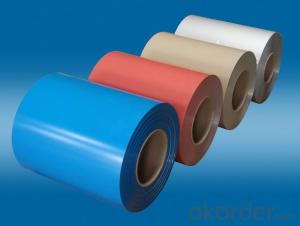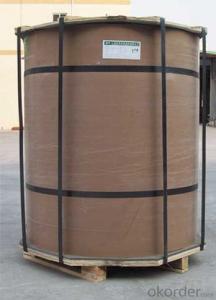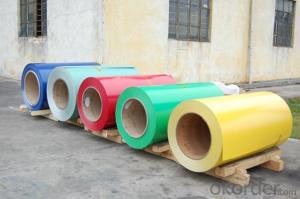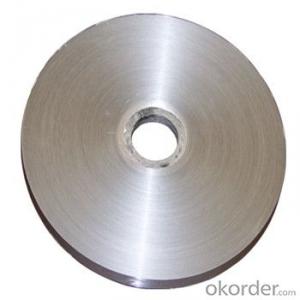Painted Aluminum Coil Stock 1050 H24 for Roofing & Ceiling
- Loading Port:
- China main port
- Payment Terms:
- TT or LC
- Min Order Qty:
- 5 m.t.
- Supply Capability:
- 5000 m.t./month
OKorder Service Pledge
OKorder Financial Service
You Might Also Like
A.Production Description of AA1050
1000 series is formed by the addition of a small amount of copper in pure aluminum, with excellent forming characteristics, high corrosion resistance, good welding and electrical conductivity. They are widely used in signs, billboards, building exterior decoration, bus body, high factory wall decoration, kitchen sink, lamp, fan, electronic components, chemical apparatus, sheet processing, deep drawing or spinning hollow ware, welding parts, heat exchangers, Bell surface and plate, plates, kitchen utensils, accessories, safety equipment etc.
Speicification:
Alloy: 1100 1060 1050, 1070
Temper: HO, H14, H24
Thickness:0.2mm-8mm
Width :20-2000mm
B. Chemical Composition of Alloy 1050
| Alloy | Si | Cu | Fe | Mg | Zn | Mn | Ti | V | Al |
| 1050 | 0.25 | 0.05 | 0.000~0.400 | 0.05 | 0.05 | 0.05 | 0.03 | 0.05 | 99.5 |
C. Mechanical Properties of Alloy 1050
| Alloy & Temper | Tensile Strength(M/PA) | Yield Strength(M/PA) | Elongation(%) | Hardness(HBS) |
| 1050 H24 | 95~130 | 75 | 6 | / |
- Q: What are the different edge treatments available for aluminum coils?
- Some of the different edge treatments available for aluminum coils include mill finish, edge trim, deburred edge, rounded edge, and hemmed edge.
- Q: Is it possible to use a soldering iron to fix a damaged or broken aluminum coil?
- <p>Using a soldering iron to repair an aluminum coil is not typically effective. Aluminum has a high thermal conductivity and doesn't bond well with solder, making it difficult to create a strong joint. Instead, consider using specialized aluminum welding techniques or brazing, which involves using a filler metal with a melting point higher than the base metal. For small repairs, you might also explore the use of aluminum repair epoxy or other adhesives designed for metal bonding. Always ensure to follow safety precautions and consult with a professional if the repair is complex or if the coil is part of a critical system.</p>
- Q: What are the advantages of using aluminum coils over other materials?
- There are numerous benefits to utilizing aluminum coils as opposed to alternative materials. To begin with, aluminum boasts a lightweight composition, thereby facilitating simpler handling and transportation. This characteristic also renders it more cost-effective, as it necessitates less energy for manufacturing and installation. Furthermore, aluminum exhibits a remarkable resistance to corrosion. It remains unaffected by rust, even when subjected to harsh environmental conditions, rendering it highly suitable for outdoor applications. The resulting durability ensures an extended lifespan and diminishes maintenance expenses in the long term. Moreover, aluminum coils excel in terms of heat transfer properties. Possessing a high thermal conductivity, they facilitate efficient heat exchange. This renders them ideal for crucial applications such as heating, ventilation, and air conditioning systems. In addition, aluminum serves as an eminently recyclable material. It can undergo multiple recycling processes without compromising its quality or performance. This not only curtails waste and contributes to environmental sustainability but also lowers production costs. Lastly, aluminum coils offer tremendous versatility in terms of design and customization. They can be effortlessly molded, shaped, and coated to meet specific requirements. This flexibility permits a wide array of applications across diverse industries, including automotive, construction, electronics, and aerospace. In conclusion, the array of advantages associated with aluminum coils, encompassing their lightweight nature, corrosion resistance, heat transfer properties, recyclability, and versatility, establishes them as the favored choice over alternative materials.
- Q: I have found many articles claiming that the aluminum content in soy (baby) formula is very high.What I am wondering is- does regular old soy milk for adult consumption also have very high aluminum content?I am extensively researching all possible ways to relieve my 14 month olds terrible constipation. He is not allergic to milk- he was on a milk-based formula. We VERY slowly switched over to whole cow's milk- which turned out to once again be terribly constipating. It was suggested I give lactose-free milk a try- which has seemed to help a little bit- it was working OK for a few days- but he did have quit the hard (and painful) bowel movement a couple days ago. We are trying other options- juices, he's active, we are trying to get enough fiber into this picky eater's diet. I am just researching the possibility of soy milk if this problem persists.I am not willing to give it to him if the aluminum content is even a small possibility. I am not finding much info about adult soy milk. Anyone??
- I found this on the FAQ for Eden Soy products: Claim 12: Soy foods may contain harmful levels of aluminum. (Fallon, 1996)[21] Answer 12: The author describes aluminum occurring in soy as a result of an industrial processing step. This occurs only when producers use harsh alkaline soaking solutions that leach aluminum from aluminum processing equipment. Not all soy processing uses alkaline soaking solutions and not all soy is produced using aluminum equipment. Harsh alkaline soaking solutions are used mainly in the production of modern soy foods such as soy protein isolates, soy protein concentrates, soy supplements, soy protein shakes, textured soy protein (TSP), etc. Eden does not use alkaline soaking solutions and does not use aluminum equipment. Our test results show no trace of aluminum in Edensoy, testing at a sensitivity of .1ppm. The study it references talks about soy formula, not soy milk. It sounds as if the soy picks up its aluminum content from the manufacturing equipment. Edensoy claims they are aluminum-free (implying that other companies are not)... however, it is of course a biased source! Our oldest has been on soy milk/goat milk combination for a while now (we don't do dairy), however, we are in process of weaning off soy for good as we have other concerns besides aluminum: MEDICAL CONDITIONS POSSIBLY ATTRIBUTABLE TO SOY CONSUMPTION Asthma Chronic Fatigue Depression Diabetes Heart Arrhythmia Heart or Liver Disease Infertility/Reproductive Problems Irritable Bowel Syndrome Learning Disabilities/ADD/ADHD Pancreatic Disorders Premature or Delayed Puberty Rheumatoid Arthritis Thyroid Conditions: Auto-Immune Thyroid Disorders (Graves’ or Hashimoto’s Disease) Goiter Hypothyroidism Hyperthyroidism Thyroid Nodules Thyroid Cancer Other thyroid disorders Uterine Cancer Weight Gain nothing is proven but the possibility is enough for us to give it up).
- Q: Is it safe or advisable to use aluminum coil for wrapping food?
- <p>Using aluminum coil to wrap food is not recommended. Aluminum can react with acidic or alkaline foods, potentially leaching harmful aluminum particles into the food. It's also not designed for food contact and may not be safe at high temperatures. Instead, use food-grade aluminum foil, which is specifically designed for cooking and wrapping food, ensuring it doesn't come into contact with non-food surfaces that could contaminate it.</p>
- Q: Can aluminum coils be used in the production of aircraft fuel tanks?
- Yes, aluminum coils can be used in the production of aircraft fuel tanks. Aluminum is a commonly used material in the aerospace industry due to its lightweight, strong, and corrosion-resistant properties. It is an ideal choice for fuel tanks as it can effectively withstand the harsh conditions and requirements of aircraft operations.
- Q: How are aluminum coils tested for quality assurance?
- Various methods and parameters are employed to test aluminum coils for quality assurance, ensuring their compliance with industry standards and customer requirements. One of the most common tests conducted on aluminum coils is dimensional inspection, which involves measuring and comparing the dimensions and tolerances of the coils with the specifications to ensure they are manufactured within the required size and shape. Mechanical properties of the aluminum coils are also evaluated as an important aspect of quality assurance testing. This includes tests like tensile strength, yield strength, elongation, and hardness, which determine the strength and durability of the coils, ensuring they can withstand intended applications and environments. Surface quality assessment of the aluminum coils involves visual inspection to identify any visual defects such as scratches, dents, or surface irregularities. Additionally, non-destructive testing methods like ultrasonic or eddy current testing are utilized to detect any hidden defects or flaws within the coils. Chemical analysis is conducted to determine the composition and purity of the aluminum coils, which is crucial to ensuring they meet required chemical composition standards as impurities can affect their performance and integrity. Corrosion resistance testing is also performed to evaluate the ability of the aluminum coils to withstand corrosion in different environments, especially when exposed to harsh conditions or corrosive substances. In summary, quality assurance testing for aluminum coils encompasses physical, mechanical, visual, and chemical evaluations. These tests are carried out at various stages of the manufacturing process to ensure the coils meet the highest quality standards and deliver reliable performance in their intended applications.
- Q: Is it possible to use a metal detector to locate an aluminum coil?
- <p>Yes, you can use a metal detector to detect aluminum coils. Metal detectors are designed to detect various types of metal, including aluminum. While they are often used for detecting ferrous metals like iron, they can also pick up non-ferrous metals such as aluminum. The effectiveness of detecting aluminum may vary depending on the type of metal detector and its sensitivity settings. Ground conditions and the size and composition of the aluminum coil can also affect detection. It's important to adjust the metal detector to the appropriate settings for detecting non-ferrous metals to increase the chances of successful detection.</p>
- Q: This question asks for a comparison of the benefits and drawbacks associated with the use of aluminum coil in various applications.
- <p>The advantages of using aluminum coil include its lightweight nature, which reduces transportation costs and enhances energy efficiency. It also has excellent thermal conductivity, making it ideal for heat exchangers and cooking utensils. Aluminum coil is corrosion-resistant, which extends its lifespan and reduces maintenance. It is also recyclable, contributing to sustainability. Disadvantages include lower strength compared to steel, which may limit its use in heavy-duty applications. It also has a higher cost than some other metals, which can affect its competitiveness in certain markets. Additionally, aluminum is a good conductor of electricity, which can be a disadvantage in applications where electrical insulation is required.</p>
- Q: The user is asking if it's safe to use aluminum coil for food preparation in a microwave oven.
- <p>No, you should not use aluminum coil for food preparation in a microwave oven. Aluminum is a metal and can cause sparks or even a fire when exposed to the microwave's electromagnetic field. It can also reflect microwaves, potentially damaging the oven. Always use microwave-safe materials such as glass, ceramic, or microwave-safe plastic containers for food preparation in a microwave.</p>
Send your message to us
Painted Aluminum Coil Stock 1050 H24 for Roofing & Ceiling
- Loading Port:
- China main port
- Payment Terms:
- TT or LC
- Min Order Qty:
- 5 m.t.
- Supply Capability:
- 5000 m.t./month
OKorder Service Pledge
OKorder Financial Service
Similar products
Hot products
Hot Searches
Related keywords


